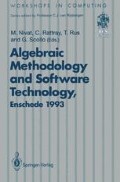Abstract
Category theory has been widely used in computer science, but usually in a very sophisticated manner. This paper argues that elementary category theoretic notions can have important value in the “real world” of software engineering. Perhaps the most elementary categorical notion is that of commutative diagram. Drawing on experience from several applications of category theory to information modelling in major business enterprises we show how commutative diagrams have been used to develop new methodologies in ER-modelling, constraint specification and process modelling. They also suggest new but as yet untested techniques for information model partitioning and information system architecture. The methodologies described here have a firm theoretical basis using the recently isolated theory of lextensive categories and this basis is briefly outlined.
Access this chapter
Tax calculation will be finalised at checkout
Purchases are for personal use only
Preview
Unable to display preview. Download preview PDF.
References
M. Barr and C. Wells, Category theory and computer science.Prentice Hall, 1990.
A. Carboni, S. Lack and R.F.C. Walters, Introduction to extensive and distributive categories, Pure Mathematics Report92–9, University of Sydney, 1992.
P.P.S. Chen, The entity relationship model—towards a unified view of data, ACM Transactions on Database Systems, 1 (1976), 9–36.
C.N.G. Dampney, M. Johnson and P. Deuble, Taming large complex information systems in D.G. Green and T. Bossomaier (eds) Complex Systems IOS Press, Amsterdam, (1993), 210–222.
C.N.G. Dampney, M. Johnson and G.P. Monro, An illustrated mathematical foundation for ERA, in C.M.I. Rattray and R.G. Clarke (eds) The unified computation laboratory, Oxford University Press, Oxford, (1992), 77–84.
CA. Gunther, The mixed power domain, to appear in Theoretical Computer Science.
Saunders Mac Lane, Categories for the Working Mathematician, Graduate Texts in Mathematics 5, Springer-Verlag, 1971.
R. Rosebrugh and R.J. Wood, Relational databases and indexed categories, Canadian Mathematical Society Conference Proceedings13 (1992), 391–407.
S. Vickers, Geometric theories and databases, London Mathematical Society Lecture Notes177 (1992), 288–314.
R.F.C. Walters, Categories and computer science, Cambridge University Press, 1992.
Author information
Authors and Affiliations
Editor information
Editors and Affiliations
Rights and permissions
Copyright information
© 1994 British Computer Society
About this paper
Cite this paper
Johnson, M., Dampney, C.N.G. (1994). On the value of commutative diagrams in information modelling. In: Nivat, M., Rattray, C., Rus, T., Scollo, G. (eds) Algebraic Methodology and Software Technology (AMAST’93). Workshops in Computing. Springer, London. https://doi.org/10.1007/978-1-4471-3227-1_5
Download citation
DOI: https://doi.org/10.1007/978-1-4471-3227-1_5
Publisher Name: Springer, London
Print ISBN: 978-3-540-19852-9
Online ISBN: 978-1-4471-3227-1
eBook Packages: Springer Book Archive

